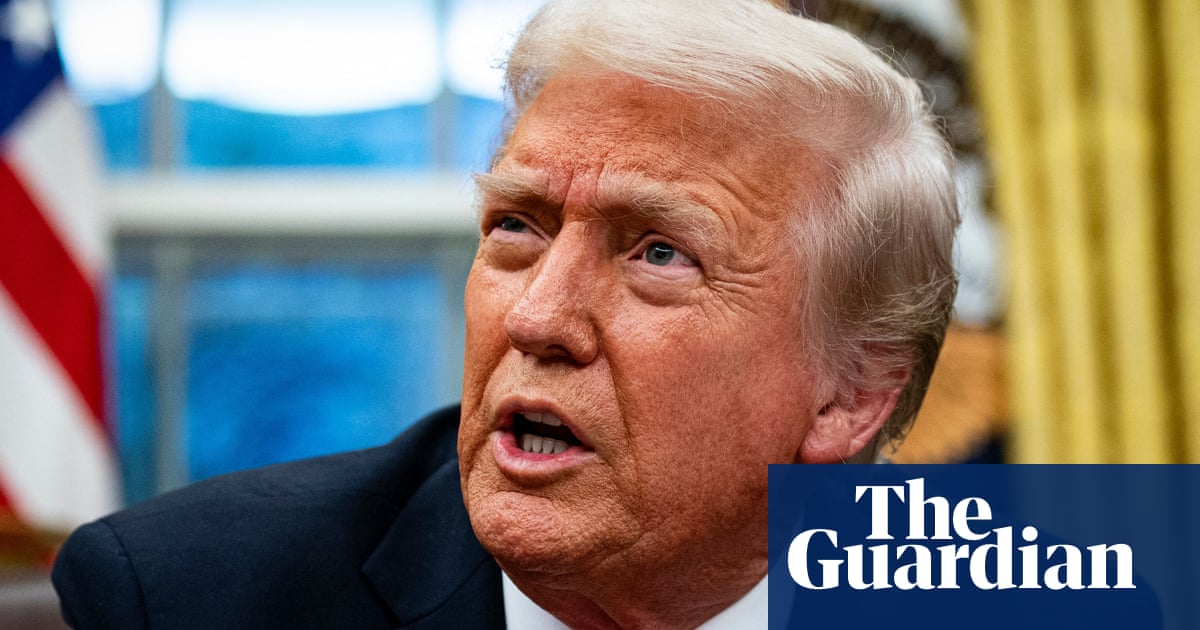Canada, Mexico and the EU have sharply criticised Donald Trump’s decision to impose 25% tariffs on all steel and aluminium imports to the US, amid mounting fears of a global trade war.
The president of the European Commission, Ursula von der Leyen, said on Tuesday she “deeply regretted” the US president’s move, announced late on Monday, adding: “Unjustified tariffs on the EU will not go unanswered.”
Von der Leyen said the US tariffs would “trigger firm and proportionate countermeasures” and vowed the 27-nation bloc would “act to safeguard its economic interests,” adding: “We will protect our workers, businesses and consumers.”
The US vice-president, JD Vance, meeting von der Leyen on Tuesday on the fringes of the AI summit, insisted the Trump administration had been “very clear that we care a lot about Europe. We see a lot of economic relationship to build upon with Europe”.
Trump signed proclamations raising the US tariff rate on aluminium from 10% to 25% and eliminating all country exceptions, quota deals and product-specific tariff exclusions for both metals with effect from 12 March.
He said the move would simplify tariffs on the metals “so everyone can understand … it’s 25%” on all countries. He has also promised reciprocal tariffs on all countries that tax imports from the US and said he was looking at tariffs on cars and pharmaceuticals.
According to US trade figures, Canada, Brazil and Mexico are the three biggest steel exporters to the US, followed by South Korea. An estimated 25% of EU steel exports go to the US, worth about €3bn a year over the past decade.
Canada’s prime minister, Justin Trudeau, who is attending an artificial intelligence summit in Paris, said on Tuesday that Canadians would “stand up strongly and firmly if we need to”, describing the Trump administration’s decision as “unacceptable”.
The Mexican economy minister, Marcelo Ebrard, said the tariffs were “unfair” and “not justified”. Mexico’s US steel exports had been falling since 2022 while imports of US steel had grown, he said, so it now “imports more steel from the US than it exports”.
South Korea’s acting president, Choi Sang-mok, said Seoul was “committed to protecting the interests of our companies and reducing uncertainties” and would seek to “build a close relationship” with Washington and explore diplomatic options.
There was also criticism from within the US, with the chief executive of Ford, Jim Farley, saying that while he believed the president aimed to strengthen the US auto industry overall, his tariff plans had “a lot of cost and a lot of chaos”.
The EU’s trade commissioner, Maroš Šefčovič, told the European parliament that Trump’s move would fuel inflation but that the bloc remained committed to finding a mutually beneficial solution as soon as possible.
“The EU sees no justification for the imposition of tariffs on our exports, which are economically counterproductive,” he said. “Tariffs are taxes, bad for businesses, worse for consumers … and harmful to the global trading system.”
Šefčovič said the commission, the EU’s executive body, was “assessing the scope of the measures announced overnight and will be responding in a firm and proportionate way by countermeasures”.
Trump imposed tariffs on steel and aluminium from dozens of countries in his first term, drawing EU countermeasures on emblematic US goods including Harley-Davidson motorcycles, bourbon whiskey, jeans and orange juice.
Germany’s chancellor, Olaf Scholz, said the EU would present a united front. “If the US leaves us no other choice, the EU will respond as one,” he told parliament. “As the world’s largest market, with 450 million citizens, we have the strength to do so.”
France’s industry minister, Marc Ferracci, said that while his country was not a major producer of aluminium or steel, it could still be indirectly affected if Chinese exports discouraged by the US tariffs instead made their way to European shores.
“We should expect that there will be some effects from Donald Trump’s tariffs,” Ferracci said. “Europe must respond in a united manner, because we know that his strategy is to divide Europeans. We must respond in a firm manner.”
Article by:Source: Jon Henley Europe correspondent










:max_bytes(150000):strip_icc():focal(718x391:720x393)/louise-lasalle-tout-2825-c7e93a6a127e4a949029f49418004115.jpg?w=300&resize=300,180)
:max_bytes(150000):strip_icc():focal(718x391:720x393)/louise-lasalle-tout-2825-c7e93a6a127e4a949029f49418004115.jpg?w=80&resize=80,80)

